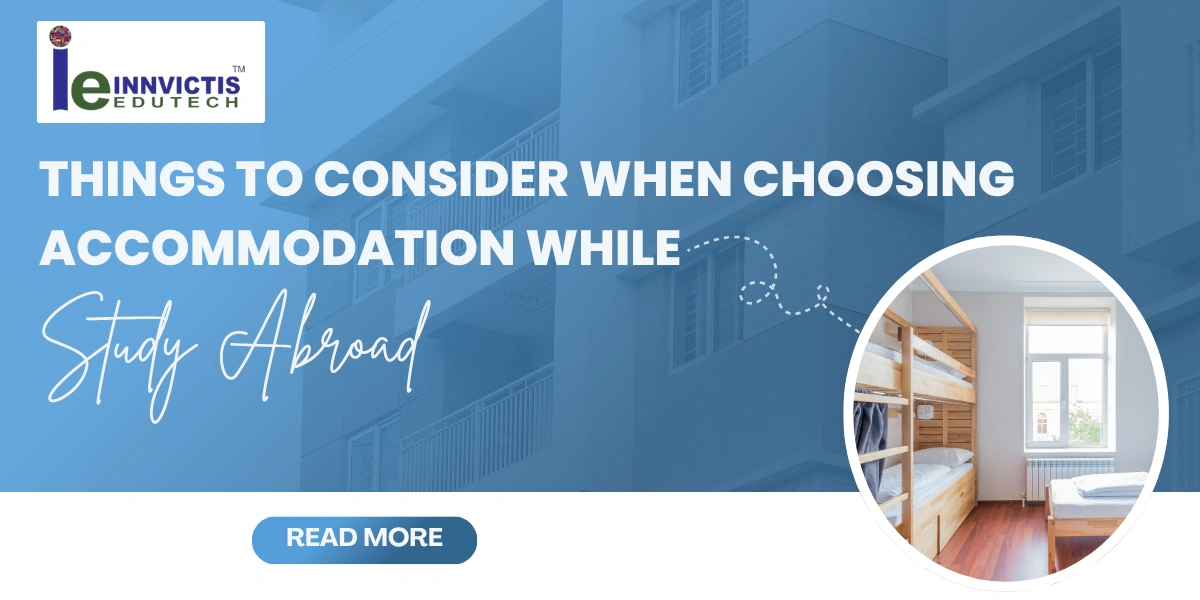Choosing where to live while studying abroad is one of the most important decisions a student can make. Your accommodation is more than just a place to sleep. It affects how comfortable you feel, how safe you are, how well you manage your money, and even how well you perform academically. A comfortable living space can help you settle into your new environment more easily, while the wrong choice can lead to stress, tiredness and unnecessary expenses.
Many international students face common challenges when searching for accommodation. Some worry about high rent, while others struggle to understand local housing contracts. Many students feel uncertain because they don’t yet know the neighborhoods in their new city. Questions about safety, transport options, and hidden costs often appear once the search begins. To help you avoid these issues, this blog explains the key factors you must consider and will guide you step by step so you can confidently choose the best accommodation while studying abroad.
Start Early in Your Search for Study Abroad Accommodation
The first rule of finding study abroad accommodation is to start early. Student cities around the world get crowded quickly, especially around the start of an academic year. The best rooms are usually booked months in advance. If you delay your search, you may end up with fewer choices or higher prices.
As soon as you receive your offer letter or admission confirmation, start exploring housing options. Early planning helps you compare different properties calmly instead of rushing at the last moment. You will have enough time to check photos, read reviews, ask questions, and understand the neighborhood. Another advantage of starting early is that landlords and student housing platforms often offer better prices to early applicants. You also avoid last-minute competition from other students who arrive in the city at the same time.
In short, early preparation gives you more power to choose rather than simply accept whatever is left.
Set a Clear Budget for Accommodation for International Students
Before selecting accommodation for international students, it is crucial to set a clear and realistic budget. Many students only consider the monthly rent, but the real cost of living includes much more. You must include the deposit, electricity bills, water charges, groceries, internet fees, and transportation costs. Some countries also charge council tax or maintenance fees.
Room types vary significantly in price. Shared apartments are generally more affordable, while private studios offer more privacy but are usually expensive. On-campus options might include utilities in the rent, while off-campus housing may require you to pay everything separately. The price can also change depending on the city. For example, central areas in major cities are usually more expensive than suburban neighborhoods.
It is also a smart habit to keep a small buffer amount for unexpected costs. Sometimes appliances may stop working, or the weather may increase your heating bill. A clear budget prevents surprises and helps you manage your finances responsibly.
Choose the Right Location for Student Accommodation Abroad
When selecting student accommodation abroad, location is one of the most important factors. Living close to your campus can save time and energy. If the accommodation is located further from campus, check whether public transport is available and reliable. Long commutes can affect your daily routine and leave you tired, especially during busy academic weeks.
It is also helpful to stay near essential places like supermarkets, pharmacies, hospitals, and bus stops. If you cook often, being close to affordable grocery stores will save both time and money.
Students should also consider the overall atmosphere of the neighborhood. Quiet residential areas are ideal for focused study, while lively areas are suitable for students who enjoy city life. Your personal preferences will guide your decision.
Remember that your location influences your lifestyle. It affects how much you spend, how safe you feel, and how easily you settle into your new environment.
Compare On-Campus vs Off-Campus and Shared vs Private Living
Choosing the right student accommodation depends on your lifestyle, budget and privacy needs. Students often compare on-campus vs off-campus housing, as well as shared rooms vs private rooms. Each option has its own advantages. On-campus living offers safety, support, and strong community life, while off-campus housing gives more independence and flexibility. Similarly, shared rooms are budget-friendly and social, while private rooms offer more personal space and quiet. Understanding these differences helps you pick what suits your study habits and daily routine best.
On-Campus vs Off-Campus Accommodation
| Aspect | On-Campus Living | Off-Campus Living |
|---|---|---|
| Safety | The university provides high security | Depends on the neighborhood and building |
| Support | Supportive environment, helpful for first-year students | More self-managed, less structured support |
| Community | Strong student community, easy to make friends | Community depends on the area and roommates |
| Independence | Less independence, university rules apply | More independence and freedom |
| Flexibility | Limited choice of rooms or locations | Flexible options in location, room type, and price |
| Access to Facilities | Immediate access to campus facilities | Depends on the distance from the campus |
| Budget Options | Fixed pricing, sometimes higher | Wider price range based on area |
Shared Rooms vs Private Rooms
| Aspect | Shared Room | Private Room |
|---|---|---|
| Cost | Cheaper, budget-friendly | More expensive |
| Privacy | Lower privacy, shared space | High privacy and personal space |
| Noise Level | Can be noisy or distracting | Quiet environment for studying |
| Social Interaction | Easier to make friends | Limited social interaction |
| Personal Space | Less space, shared arrangements | Full control over the room and belongings |
| Lifestyle Fit | Good for social, easy-going students | Good for focused, independent students |
Prioritize Safety When Choosing Safe Student Accommodation Abroad
Safety should always be a priority when looking for safe student accommodation abroad. Start by checking the property’s security features. Look for CCTV cameras, secure entry systems, proper lighting, and fire safety equipment. These features protect you and create peace of mind.
It is also helpful to read student reviews or talk to your university’s housing office. They often know which areas are safe and which ones students should avoid. Search for information about the neighborhood, especially if you are arriving late at night or plan to travel frequently.
International students often worry about safety because they are in a new country with unfamiliar rules. A safe neighborhood helps you feel more confident and helps parents worry less. Your accommodation should make you feel at home, not stressed.
Check Facilities and Furnishings Before Finalizing Student Accommodation Abroad
Before finalizing your student accommodation abroad, make sure to check what facilities are included. Some accommodations come fully furnished with a bed, desk, wardrobe, and basic appliances. Others are unfurnished, which means you will need to invest additional money in furniture.
Make sure the building offers facilities like a kitchen, laundry area, heating or cooling systems, and proper ventilation.. Internet speed is extremely important because online classes, exams, and assignments depend on stable connectivity. If the internet is slow, it will affect your productivity.
Check the cleanliness of the building and ask about maintenance services. Some landlords handle repairs quickly, while others take longer. Knowing this in advance prevents future inconveniences.
Understand Lease Terms for Your Accommodation Checklist for Study Abroad
Your accommodation checklist for study abroad must include a thorough understanding of the lease terms. Lease agreements vary by country and landlord, so read everything carefully. Check the duration of the contract, the deposit amount, the rent cycle, and the renewal process.
Many international students forget to ask about penalties. Some landlords charge a fee if you leave early or cancel the agreement late. You should also check whether you need a guarantor, which is common in many countries. Clarify which utilities are included in the rent and which you must pay for separately. Make sure to confirm who is responsible for repairs and maintenance, so you don’t face unexpected charges.
Understanding your lease protects you from financial surprises. It helps you stay informed and prevents misunderstandings with the landlord.
Think About Lifestyle and Roommate Compatibility in Accommodation for International Students
When choosing accommodation as an international student, matching your lifestyle with your roommates is very important. Make sure you consider basic daily habits such as sleep timings, cleanliness levels, study routines and cooking preferences. These small differences can affect how comfortable you feel at home.
Good communication can prevent most problems. Before moving in, talk about expectations, who cleans, study hours, noise levels and shared responsibilities. This helps everyone stay on the same page.
It’s also important to respect cultural differences and personal space. Living with people from different countries can be a great experience when everyone understands each other’s boundaries and habits.
When your roommate’s lifestyle matches yours, your study-abroad journey becomes much smoother, happier, and more enjoyable.
Calculate Move In Costs and Hidden Expenses When Choosing Accommodation While Studying Abroad
Many students underestimate moving costs when choosing accommodation while studying abroad. Apart from rent, the first month often includes a deposit, security fees, transport to the new accommodation and setup costs like bedding or kitchen items.
Some countries have seasonal utility variations. Heating can increase costs in winter while cooling can increase costs in summer. Other hidden expenses may include cleaning fees, maintenance charges, parking fees or local taxes.
Creating a simple monthly and one time budget helps you stay prepared and avoid financial stress.
Use Student Networks and University Support to Find International Student Housing
When searching for international student housing, remember that you are not alone. Universities often have housing support teams that provide verified accommodation options. This reduces the risk of scams and gives you a safe starting point.You should also join student groups and online communities on platforms like Facebook, WhatsApp, or university forums. These spaces are full of genuine student reviews, photos, neighborhood suggestions, and real-time room postings from people who have lived in those areas. This helps you understand what a place is actually like before you commit.
Seniors and alumni are another valuable source of guidance. They can share honest feedback about different localities, transportation options, safety levels, and the best–or worst–landlords to rent from. Their experience can save you from making common mistakes.
Lastly, connecting with international student communities offers more than just housing help, it gives you emotional support and a sense of belonging. These groups can guide you through cultural differences, help you settle in faster, and make your overall study-abroad experience far smoother and safer.
Quick Accommodation Checklist
Before you finalize your accommodation, make sure you confirm the following:
Budget & Costs
- Monthly rent fits your budget
- Deposit amount and refundable conditions
- Utility costs (electricity, water, heating, Wi-Fi)
- Hidden or extra fees (cleaning, maintenance, taxes, parking)
- Move-in costs and required documents
Location
- Distance to university
- Available public transport options
- Safe and student-friendly neighborhood
- Close to supermarkets, pharmacies, hospitals, and essential stores
Safety
- CCTV cameras and a secure entry system
- Proper lighting inside and around the building
- Fire safety equipment installed
- Verified landlord or accommodation provider
Facilities & Furnishing
- Fully furnished or unfurnished (bed, desk, chair, wardrobe)
- Kitchen facilities (stove, fridge, microwave)
- Laundry availability
- Heating/cooling and ventilation system
- Internet speed suitable for online classes
Lease Terms
- Contract duration and renewal rules
- Deposit and refund policies
- Early exit penalties
- Utilities included/not included
- Guarantor requirement
Lifestyle & Roommates
- Compatible roommate habits (sleep schedule, cleanliness, study routine)
- Clear rules about shared responsibilities
- Quiet environment for studying
Commute
- Travel time to campus
- Cost of daily transport
- Safety when commuting at late hours
Amenities
- Nearby grocery stores, cafes, bus stops, gym, and library
- Access to campus facilities (if staying on campus)














